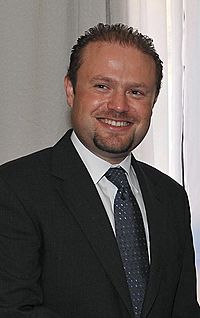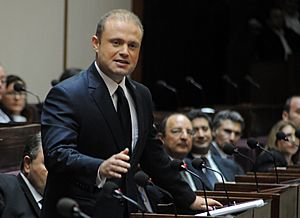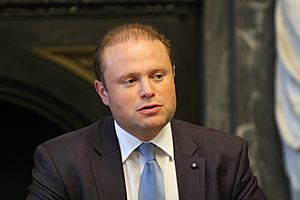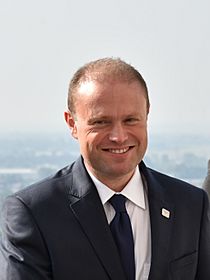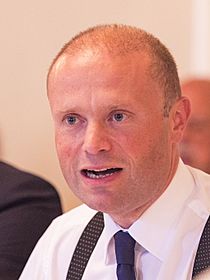Joseph Muscat facts for kids
Quick facts for kids
Joseph Muscat
|
|
|---|---|
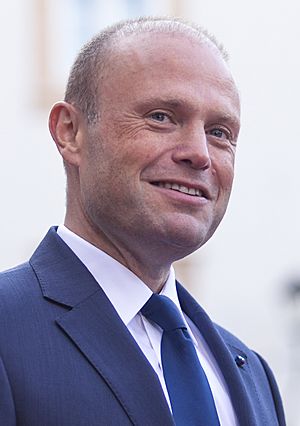
Muscat in 2018
|
|
| 13th Prime Minister of Malta | |
| In office 11 March 2013 – 13 January 2020 |
|
| President | George Abela Marie Louise Coleiro Preca George Vella |
| Deputy | Louis Grech Chris Fearne |
| Preceded by | Lawrence Gonzi |
| Succeeded by | Robert Abela |
| Leader of the Opposition | |
| In office 1 October 2008 – 11 March 2013 |
|
| President | Eddie Fenech Adami George Abela |
| Prime Minister | Lawrence Gonzi |
| Preceded by | Charles Mangion |
| Succeeded by | Lawrence Gonzi |
| Leader of the Labour Party | |
| In office 6 June 2008 – 12 January 2020 |
|
| Preceded by | Alfred Sant |
| Succeeded by | Robert Abela |
| Member of the European Parliament for Malta | |
| In office 12 June 2004 – 25 September 2008 |
|
| Personal details | |
| Born | 22 January 1974 Pietà, State of Malta |
| Political party | Labour |
| Spouse | Michelle Tanti |
| Children | 2 |
| Education | University of Malta University of Bristol |
Joseph Muscat (born 22 January 1974) is a Maltese politician. He was the 13th Prime Minister of Malta from 2013 to 2020. He also led the Labour Party from 2008 to 2020.
Muscat was elected Prime Minister in 2013 and won re-election in 2017. Before becoming prime minister, he was a Member of the European Parliament (MEP) from 2004 to 2008. He also served as the Leader of the Opposition in Malta.
As prime minister, Muscat's government made big changes. These included new laws for civil rights, like legalizing same-sex marriage in 2017. His government focused on growing Malta's economy. Many people praised him for the country's economic success. However, he also faced criticism over claims of corruption and how the government was run.
In 2019, large street protests took place. They were connected to the investigation into the death of journalist Daphne Caruana Galizia. Because of the pressure from these protests, Muscat announced he would resign. He officially stepped down as prime minister on 13 January 2020.
Contents
Early Life and Education
Joseph Muscat was born on 22 January 1974, in Pietà, Malta. He is an only child. He attended St. Aloysius' College for his early education.
Later, he studied at the University of Malta. He earned degrees in Management, Public Policy, and European Studies. In 2007, he received a Doctorate (PhD) in Management Research from the University of Bristol in the United Kingdom.
Muscat is married to Michelle Muscat, and they have twin daughters.
Start in Politics
Muscat became involved in politics at a young age. He was a member of the Labour Party's youth group, the Labour Youth Forum. He also worked as a journalist for the Labour Party's news outlets.
Before entering politics full-time, he worked as an investment adviser. He was a strong voice against Malta joining the European Union. However, after the Labour Party lost the 2003 election, he helped change the party's view. The party then began to support being part of the EU.
Member of the European Parliament (2004–2008)
In 2004, Muscat was elected to the European Parliament. This was surprising to some because he had previously opposed Malta's EU membership. In the European Parliament, he worked on important committees. These included the Committee on Economic and Monetary Affairs.
He worked on rules for mobile phone roaming charges and other issues that affected people directly. He resigned from the European Parliament in 2008 to become the leader of the Labour Party in Malta.
Leader of the Labour Party
In June 2008, Joseph Muscat was elected as the new leader of the Labour Party. He was not yet a member of Malta's parliament, so a seat was given to him. As leader, he began to modernize the party. He changed its official name and logo to appeal to more voters.
Under his leadership, the Labour Party won the 2009 European Parliament elections by a large margin. This was a big success for Muscat and showed that his changes were popular.
In 2011, a national vote, or referendum, was held on whether to allow divorce in Malta. Muscat personally supported allowing divorce. The "yes" side won, and Muscat said it was the birth of a "new Malta."
By the end of 2012, the government at the time lost an important vote on its budget. This led to a new general election being called for March 2013.
Prime Minister of Malta (2013–2020)
In the 2013 general election, the Labour Party won a major victory. Their slogan was "Malta belongs to all of us." Muscat became Prime Minister on 11 March 2013.
First Term as Prime Minister
When Muscat took office, Malta's economy was facing challenges. His government focused on improving the economy. They lowered electricity and water bills, which was a major promise. They also introduced free childcare and increased benefits for families.
Under his leadership, Malta's economy grew quickly. Unemployment fell to one of the lowest rates in Europe. The government's budget went from a deficit (spending more than it earns) to a surplus (earning more than it spends).
His government also passed the Individual Investor Programme. This program allowed wealthy individuals to get Maltese citizenship by investing a large amount of money in the country.
In 2017, Malta held the Presidency of the Council of the European Union for six months. This meant Malta was in charge of leading meetings and finding agreements among EU countries.
The Panama Papers
In 2016, a major leak of documents called the Panama Papers happened. It showed that two of Muscat's closest aides, a minister and his chief of staff, owned secret companies in Panama. This caused a big controversy.
Later, a journalist claimed that Muscat's wife also owned a secret company. Muscat strongly denied this and called for an official investigation. The investigation, which finished in 2018, found no proof that Muscat or his wife were connected to the company.
Because of the controversy, Muscat called an early general election in 2017.
Second Term as Prime Minister
In the 2017 general election, the Labour Party won again with a large majority. One of the first things Muscat's government did was to legalize same-sex marriage.
His government also started a huge project to fix and upgrade all of Malta's roads. They planned to spend €700 million over seven years on this project.
Under Muscat, the Labour Party won every election it contested between 2009 and 2019. This made him one of the most successful political leaders in Malta's history.
2019 Political Crisis and Resignation
In October 2017, the investigative journalist Daphne Caruana Galizia was killed in a car bomb attack. This event shocked Malta and the world. Muscat promised a full investigation to find who was responsible.
The investigation led to the arrest of several people. In November 2019, a well-known businessman was arrested in connection with the case. This led to a political crisis, as the businessman had links to people high up in the government.
Many people began to protest in the streets, calling for Muscat to resign. On 1 December 2019, Muscat announced that he would step down as prime minister. He officially resigned on 13 January 2020, after his party chose a new leader, Robert Abela.
Life After Politics
After resigning as prime minister, Muscat also resigned from his seat in Parliament in October 2020.
In July 2021, a public inquiry into the death of Daphne Caruana Galizia released its report. It stated that while the government was not directly involved, it had created a culture where such a crime could happen. Muscat said he accepted the report's findings but disagreed with some of its conclusions.
Since leaving office, Muscat has faced legal challenges related to a deal to privatize three state hospitals, which happened while he was prime minister.
Honours
National Honours
 Malta: Companion of Honour of the National Order of Merit (2013)
Malta: Companion of Honour of the National Order of Merit (2013)
Foreign Honours
 United Kingdom: Honorary Knight Commander of the Order of St Michael and St George (2015)
United Kingdom: Honorary Knight Commander of the Order of St Michael and St George (2015) Greece: Grand Cross of the Order of Honour
Greece: Grand Cross of the Order of Honour Germany: Great Cross of Merit – Grand Cross
Germany: Great Cross of Merit – Grand Cross Ukraine: Order of the Prince Yaroslav the Wise – II class
Ukraine: Order of the Prince Yaroslav the Wise – II class Italy: Knight Grand Cross of the Order of Merit of the Italian Republic (2018)
Italy: Knight Grand Cross of the Order of Merit of the Italian Republic (2018)
See also
 In Spanish: Joseph Muscat para niños
In Spanish: Joseph Muscat para niños
 | William M. Jackson |
 | Juan E. Gilbert |
 | Neil deGrasse Tyson |


